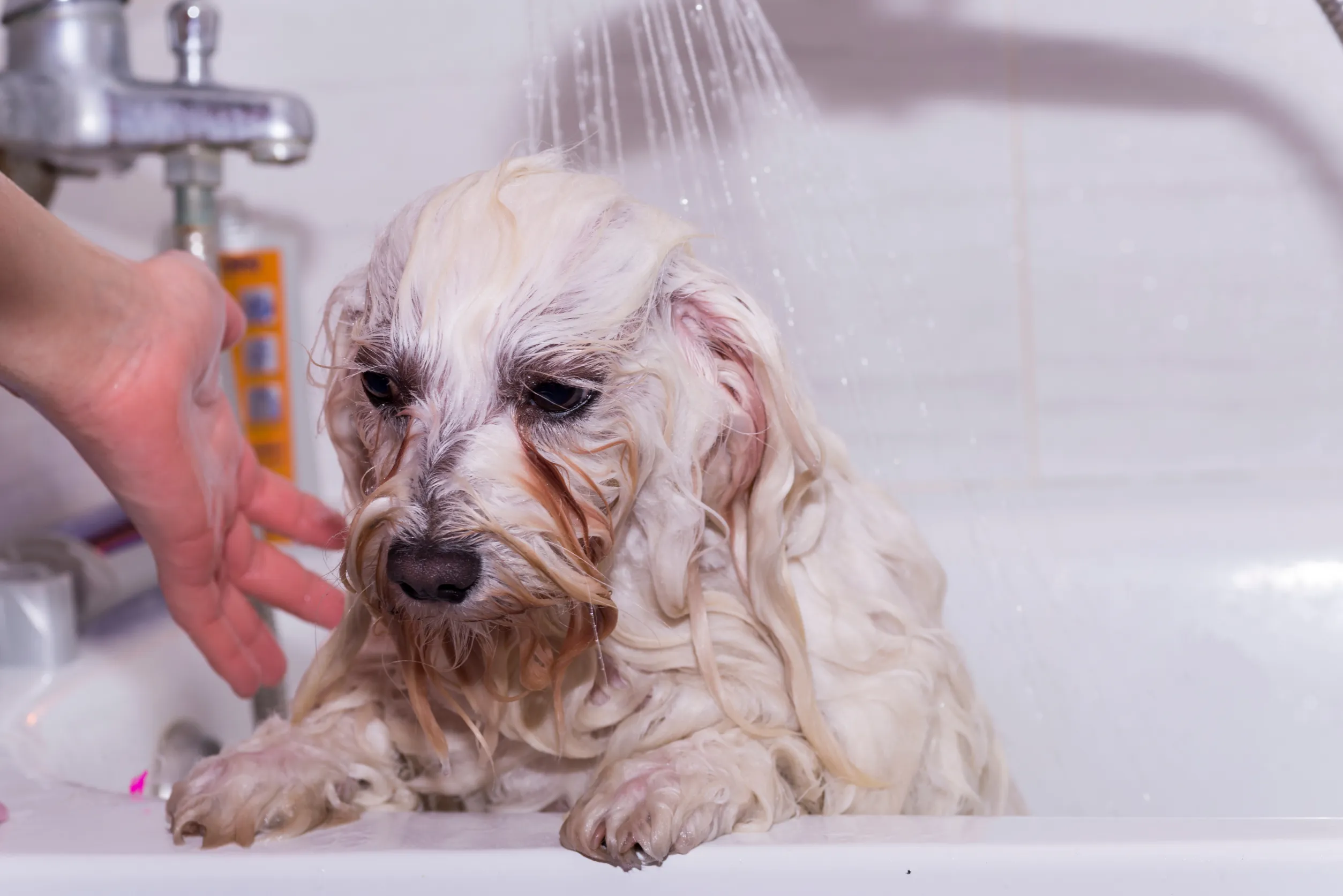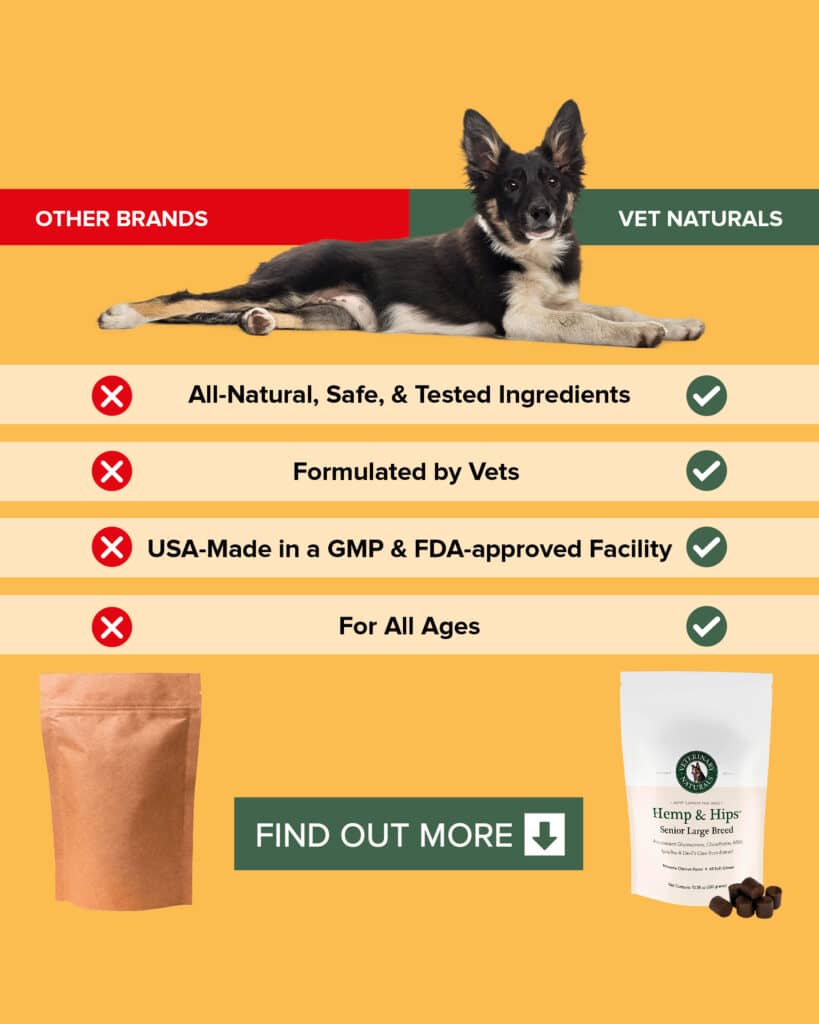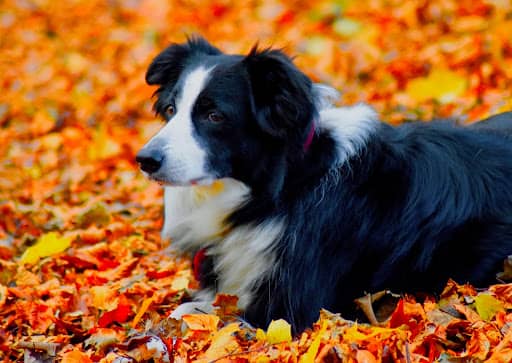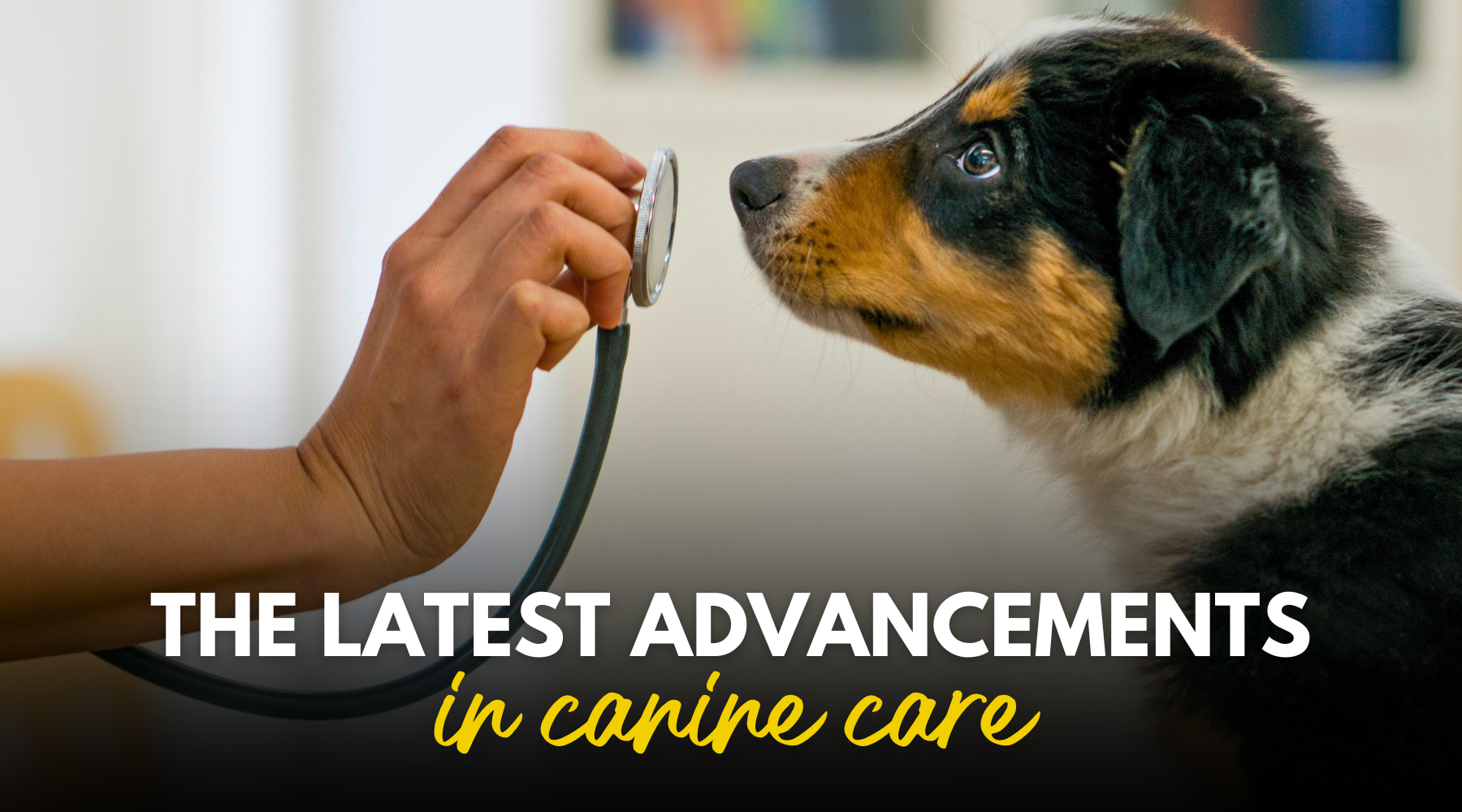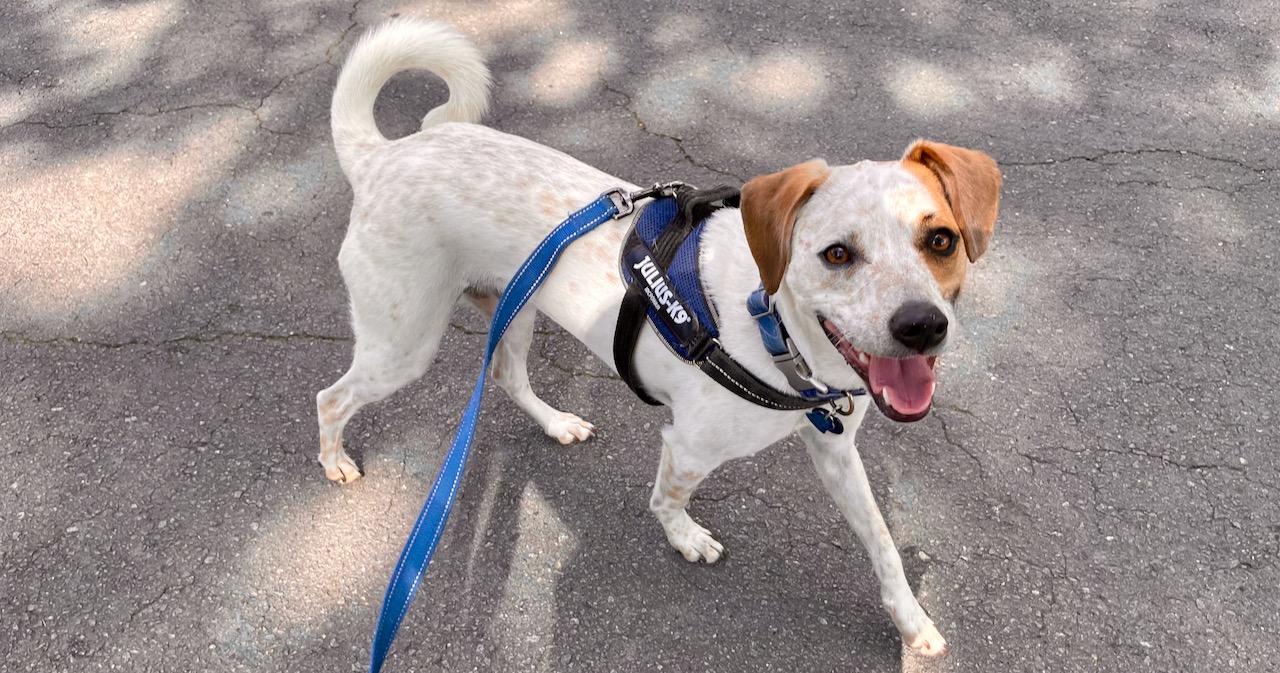Why does my dog still stink after a bath???
As much as we love our dogs, it can make life difficult when they’re stinky.
Your home may smell bad or you may just struggle to get close and affectionate with your pup.
If you’ve tried giving them a bath and it hasn’t helped, you may need to adjust their grooming routine, or there could be an underlying issue at bay.
Let’s take a look at the possible reasons and solutions for your dog smelling bad after a bath and how to deal with a stinky dog.
Why Does My Dog Still Stink After a Bath?
From easy-to-resolve reasons like using the wrong products for your pup’s coat to more serious medical conditions, there are actually quite a few reasons why your dog may still stink after a bath. Let’s start with the simplest causes and work our way down.
Head’s up: this post includes affiliate links. If you buy anything through these links, DogVills earns a small commission at no extra cost to you.
Check your bathtime routine
First, it’s important to make sure your dog’s bathtime routine is satisfactory. To bathe your dog properly, you need a suitable place to do it. Your bathtub, shower, or backyard will do if it’s warm outside. Grooming tubs are also great, but a bit on the pricey side.
Once you’ve called your dog over to the spot, get them to stand or sit still. Ask a family member to help keep them still and comfort them if they’re fidgety. Then, wet their fur with warm water and shake your bottle of shampoo.
Pour some into your hand and lather up your dog’s coat thoroughly, starting from the neck and going all the way down to the tail, taking care around the eyes and ears, as well as the nose and mouth.
Gently massage it into their skin section by section and let it sit in the coat for 5-10 minutes. Then, rinse it away with more warm water and repeat if necessary.
If you have a conditioner, follow up with that, and once you’ve rinsed their coat thoroughly, towel dry the excess water from their body and let them air dry.
You can also use a hairdryer on a cool setting if your dog doesn’t mind, and don’t forget to reward them afterward!
Not enough grooming
Another reason for your pup still smelling after a bath is that you’re not bathing them often enough. Different coat types require different amounts of grooming.
Thinner coats and those that are short and smooth or coarse, such as a Boxer, typically require minimal grooming; weekly brushing, and a bath once or twice per year, or more often if they get dirty on walks.
Medium-length coats with softer or more textured fur that knot, mat, and trap dirt more easily need more regular brushing and bathing.
Longer and curly coats, such as that of a Poodle, need brushing every or every other day as well as monthly baths and haircuts. It’s best to ask your vet for specifics on how often you should groom your dog.
It’s also important that you use the right brush for your dog’s fur to make sure their needs are met, and be sure to keep to monthly haircuts if necessary for your breed.
Shorter, thinner, less textured coats only require pin and bristle brushes, but longer, denser, more textured coats need rake brushes and de-shedders. Otherwise, knots can build up and turn into mats.
Mats are not only uncomfortable and painful, but they trap dirt, cause bad smells, and even lead to skin infections.
Using the wrong products
Another possibility of why your dog still stinks after taking a bath is that you’re using the wrong products.
It’s a good idea to use all-natural dog shampoos that don’t contain chemicals, especially if your dog has sensitive skin. The type of shampoo your dog needs will also depend on their coat type.
There are doggy shampoos made for smooth coats, curly coats, and different colors, lengths, breeds, and ages, as well as shininess and even skin conditions, sensitivities, and allergies, plus issues like excessive shedding, matting, and hair loss.
You can even buy deodorizing shampoos that are specifically made to target smelly dogs, and scented aromatherapy shampoos that leave your dog smelling lovely.
Key coat care ingredients
The key ingredients of canine coat care include:
- Omega-3 & 6 fatty acids
- Zinc
- Biotin
- Vitamin E
Omega fatty acids come from oily fish and certain vegetables and nuts. They have many benefits for dogs, including the nourishment of their coat and skin.
Zinc is a mineral that provides skin protection and improves certain skin conditions, and Biotin, also known as Vitamin B7, is a commonplace ingredient in both human and doggy haircare products.
It stimulates healthy hair growth and thickens the coat, while Vitamin E moisturizes the skin and fur, adding shine and volume. It also reduces sun damage and soothes skin sensitivities and irritation with its natural anti-inflammatory properties.
Ingredients to avoid
The following ingredients can cause irritation and damage to your dog’s coat and skin, harming their hygiene and health.
- Artificial fragrances
- Artificial colorants
- Soaps
- Dyes
- Bleach
- Alcohol
- Phthalates
- Parabens
- Sulfates
- Formaldehyde
- Isothiazolinone
- Cocamide-MEA
- Triethanolamine
- Polyethylene Glycol
- PEG-40 Lanolin
Can I use human shampoo on my dog?
You can use baby shampoo on your dog in an emergency, but it’s important that you use a shampoo made for dogs on a regular basis.
This is because human hair has a different PH balance than dog fur, so using human products on your dog regularly can actually disrupt their PH balance and damage their coat and skin.

Allergies
Allergies are another possible reason for your dog’s stinkiness. Any dog can have an allergy, but certain breeds are more prone than others. Poodles and Poodle crossbreeds, for example, are more prone to allergies than others.
Topical allergies
Symptoms of an allergic reaction to a topical product include swollen, runny eyes and runny noses, as well as red, irritated skin. If your dog reacts to any grooming product in this way, you should stop using it and seek out hypoallergenic shampoo instead.
Hypoallergenic products are free from common allergens to avoid triggering a reaction in sensitive pups. You can also try making your own.
Food allergies
Food allergies are also known to cause smelliness, as well as excessive shedding, dull, dry, or oily coats, low energy, and stomach upsets.
If you think your dog could be allergic to something in their diet, consider doing a food allergy test with your vet and cut out whatever is causing their reaction, or invest in hypoallergenic food if necessary.
Can I make my own dog shampoo?
If you would rather make your own shampoo for your dog, you can do so using these affordable, everyday ingredients.
- 1 cup warm water
- 1 cup uncooked oatmeal
- ½ cup baking soda
- ½ cup of white vinegar or apple cider vinegar
- For a nice smell, add a few drops of lavender essential oil
- For conditioning, add a couple of teaspoons of coconut oil or argon oil
Oatmeal is a great binder but it’s also one of nature’s best soothers, perfect for sensitive and irritated skin. Baking soda is a fantastic exfoliator for scrubbing and lathering, as well as stimulating hair growth and removing excess fur. It’s also a natural de-oderizer for removing bad smells, as is vinegar, a natural cleanser.
The oils are an optional extra, but essential oil will give your pup’s coat a nice scent, and a teaspoon or two of coconut or argon oil, both of which are rich in vitamin E, will condition and soften your dog’s coat, adding shine and body.
Should I use conditioner?
Most dog shampoos incorporate conditioning ingredients so a conditioner isn’t necessary, and others come with separate conditioners. Either way, conditioning your dog’s coat can be good to soften rough coats and reduce tangles and mats in longer coats, but avoid overdoing it as you don’t want to make it too oily.
Can I bathe my dog too much?
You can absolutely bathe your dog too much. Every dog has different grooming needs, and bathing them more often than what is necessary can strip their coat of its natural oils and damage their coat and skin.
What if my dog hates baths?
If your dog hates being bathed, it can make it difficult to do it properly or often enough. Consider using a waterless or dry shampoo instead, or at least incorporating one into your routine to increase the time between baths.
Try to make grooming a positive experience, too, by going slowly and rewarding your pup as you go. You can even take breaks in between sections of the coat. If it’s a real struggle, leave it to a professional groomer.
Other possibilities for stinky coats
Another possibility as to why your dog is stinky after having a bath is a skin condition called seborrhea or seborrheic dermatitis. This could be the case if your dog is also very itchy. There are two types of seborrhea; oily and dry, although it’s common to have a combination of both.
This condition causes the skin to release a waxy, greasy substance in the ears, armpits, and around the belly, elbows, and ankles. It is very smelly and itchy and can even become sore and bleed or lead to infections.
Causes can be related to other conditions or environmental factors, which if treated, will make the condition go away. If the condition is unexplained or hereditary, it can be managed with supplements and topical treatments.
It’s important to get any symptoms or conditions checked out and diagnosed by a vet as soon as possible to keep your dog happy and healthy.
Why does my dog stink after being outside?
What dogs encounter outside, from mud and animal poop to plants, can linger on their skin and fur and cause unpleasant smells. This is especially true after walking in the rain. Unlike us, dogs sweat through their paws and slightly hair follicles, so to get rid of bad smells after walkies, clean off their paws and give them a bath after a particularly dirty walk.
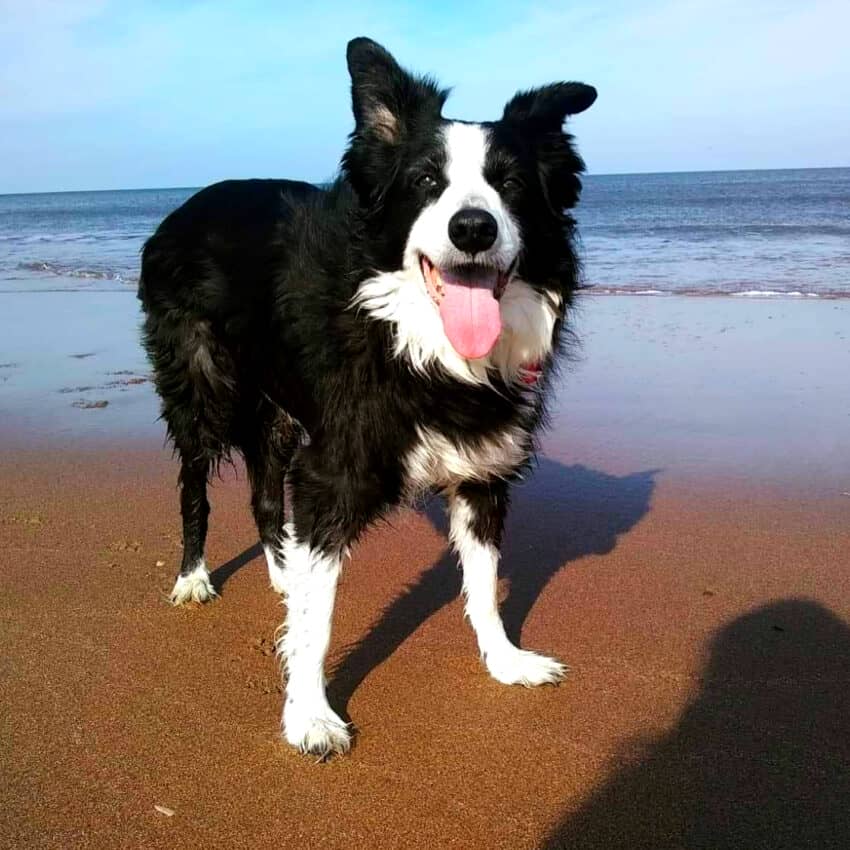
Why does my dog stink after walking in the rain?
Wet dog smell is something all of us owners are familiar with. It happens because as the rain starts to evaporate from their fur, it carries the bacteria and yeast with it, so you smell it in the air, but it is only temporary and should go away as your dog’s fur dries.
Why does my dog stink like fish?
A fishy smell is common in dogs having problems with their anal sacs. It’s a very common problem, affecting around 4% of dogs seen by vets each year, and can cause a fishy smell as well as pain and discomfort.
Other common signs of anal sac problems include bum scooting or dragging, problems going to the toilet, and tail chasing. These problems range from less serious, such as common blockages, to more serious, such as infections and tumors, but all require veterinary treatment.
Why does your dog still stink after taking a bath? There are many possible explanations, from using the wrong grooming products to food allergies and other health conditions. Try out our top tips and ask your vet for further advice if nothing helps or the problem gets worse.
